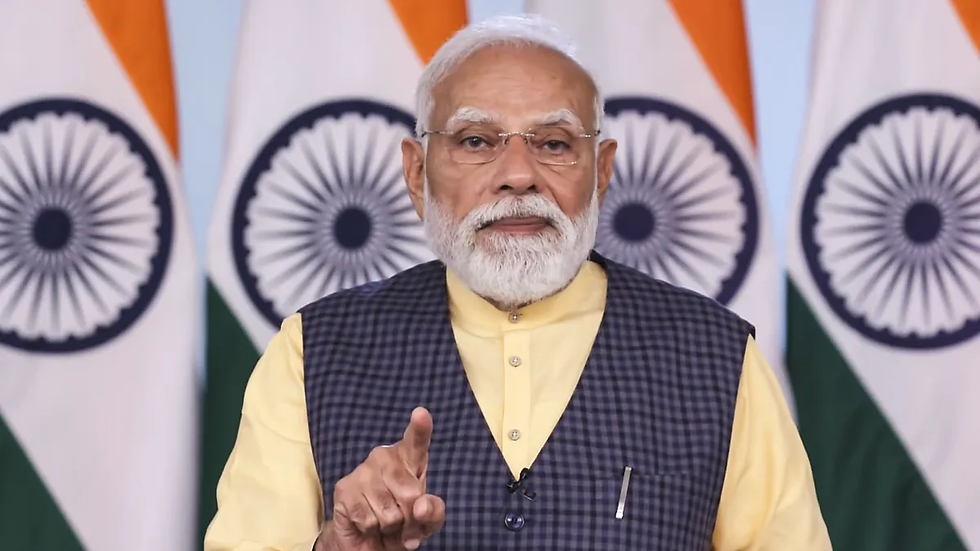Bihar’s Verdict and the Battle Over Voter Lists: Amit Shah’s Pitch for a Nationwide Purification Drive
- MGMMTeam

- Nov 21, 2025
- 4 min read
Union Home Minister Amit Shah has framed the BJP-led NDA’s sweeping victory in Bihar as far more than an electoral win—it is, he argues, a decisive public endorsement of a nationwide campaign to cleanse the voters’ list of “infiltrators” and protect the sanctity of Indian democracy. Speaking at the 61st Raising Day of the Border Security Force (BSF) in Bhuj, Gujarat, Shah positioned the Special Intensive Revision (SIR) process not merely as an administrative exercise but as a moral and national obligation.

SIR as a Purification of Democracy
Shah described the SIR as a “purification” drive aimed at ensuring that only eligible citizens participate in the democratic process. According to him, infiltration into border states and the subsequent inclusion of such individuals in voters’ lists threatens both national security and electoral integrity. He argued that the public, particularly in Bihar, has already given its stamp of approval to this reform initiative. The NDA’s emphatic victory, he said, is a reflection of the people’s desire to remove infiltrators who distort democratic outcomes.
The Home Minister claimed that certain opposition parties oppose SIR not because of concerns about voter rights but because they depend on illegal voters to maintain their political base. He warned that those who stand with infiltrators stand against the nation’s interest, asserting that infiltrators have “no right to pollute India’s democratic system.”
Opposition Outrage and Fears of Disenfranchisement
Shah’s remarks have sparked strong reactions from opposition parties across the country. In states like West Bengal and Tamil Nadu, parties including the Trinamool Congress and DMK have denounced SIR as a politically motivated sweep that could remove thousands of valid voters. DMK chief M.K. Stalin termed the drive a “conspiracy web” allegedly designed to delete names of marginalized groups—women, minorities, and poorer communities—under the garb of electoral cleansing.
Critics claim that the SIR is being executed too aggressively and too close to key elections, raising concerns about misuse. They argue that while maintaining accurate electoral rolls is necessary, the current scale and speed of revision risks creating mass disenfranchisement. The opposition insists that democratic participation cannot be sacrificed for political convenience, accusing the Election Commission of acting under central pressure.
Infiltration, Border Security, and the National Narrative
At the BSF event, Shah tied the voter-list debate to India’s broader security framework. He praised the BSF’s role in tackling infiltration along India’s frontiers and highlighted advancements in border technology, including the upcoming rollout of the “e-border security” system, which recently completed its trial phase. The Home Minister emphasised the government’s commitment to modernising the BSF and strengthening surveillance capabilities.
He also reiterated the government’s resolve to eradicate the Naxal problem by March 31, 2026, calling it a long-pending national priority. The fight against infiltration and left-wing extremism, he said, forms the bedrock of India’s internal security doctrine—one that requires both technological enhancement and political will.
The Political Stakes Behind Voter-List Revision
The SIR debate touches the core of India’s electoral politics. Supporters view it as an overdue correction that safeguards Indian democracy from being diluted by illegal migration, especially in border states with a long history of demographic pressure. Shah’s argument is that democracy becomes meaningless if non-citizens influence electoral outcomes, turning elections into a compromised exercise.
Opponents, however, warn that SIR could become a tool for political engineering—silently reshaping voter demographics in ways that favour the ruling party. With major elections approaching in several states, the fear of selective voter deletion looms large. The tension between election integrity and voter rights—already a sensitive issue in Indian politics—has erupted into a national conversation.
The MGMM Outlook
Amit Shah’s interpretation of the Bihar verdict signals a broader national shift toward securing India’s democratic foundations. The mandate in Bihar, as Shah highlights, is not just an electoral triumph but a public endorsement of a stricter, more uncompromising approach to voter-list purification. His argument—that infiltration and illegal voting have long distorted outcomes in border-affected regions—resonates with a growing national sentiment demanding cleaner electoral rolls and stronger internal security. By linking the Special Intensive Revision (SIR) drive to larger issues like infiltration, border management, and BSF modernisation, Shah frames the initiative as part of a wider national security architecture rather than a political move. Seen from this perspective, the push for SIR becomes a long-overdue correction to decades of unchecked demographic manipulation.
Opposition outrage, meanwhile, appears less rooted in genuine concern for democratic participation and more in political anxiety over losing entrenched vote banks. Their criticism—that SIR risks disenfranchising communities—is increasingly viewed as an attempt to shield the very irregularities that have historically benefited them. While maintaining clean electoral rolls is universally acknowledged as essential, the resistance to SIR’s implementation raises questions about who truly fears transparency. As the debate intensifies across states like Tamil Nadu and West Bengal, it becomes evident that the clash is not merely administrative but ideological: a confrontation between those who want to protect the sanctity of citizenship and those who weaponise identity politics to preserve political relevance. In this changing landscape, the Bihar verdict stands as a sharp indicator that the public is leaning toward stronger safeguards for democratic integrity.
(Sources: Hindustan Times, India Today, Business Standard)




Comments